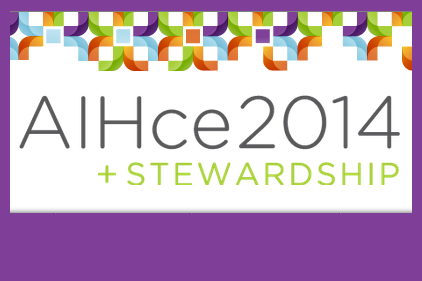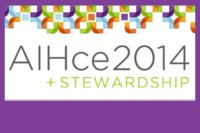 This article is re-posted with permission from AIHA and The Synergist magazine.
This article is re-posted with permission from AIHA and The Synergist magazine.
On Wednesday, June 4, Michael (Mike) K. Harris, PhD, CIH, the recipient of the 2014 Donald E. Cummings Award, urged AIHce 2014 attendees to make industrial hygiene better known to the wider public in order to attract millennials to the field. Harris, who earned his doctorate degree from Louisiana State University in 1979 and is president of Hamlin & Harris, Inc., in Baton Rouge, La., explained that reaching out to students and early career professionals is what each and every industrial hygienist needs to do in order to establish and grow market presence.
Life and death consequences
“My introduction to industrial hygiene began when I was 42 years old. I was blown away to learn that there was a profession devoted to making sure that we prevent those who work from getting sick or harmed,” said Harris. “I remember thinking, ‘the execution of my work has life-and-death consequences and it’s my job to make things happen so people can go home whole and healthy.”
Harris, who prior to a career in industrial hygiene taught aircraft welding at the U.S. Army Transportation School and welded environmental test equipment for Ling Electronics and aircraft drop tanks at Royal Industries, discussed how the Occupational Safety and Health (OSH) Act of 1970 was a turning point in the lives of workers and industrial hygienists at the time.
Everything changed
“For those who weren’t working at a manufacturing plant or in a factory at the time the OSH Act was passed, it’s hard to fully grasp how much everything changed and how much of an impact it had on our profession. It [the Act] told people that the most valuable asset they had in their workplaces was their work force.”
Harris reflected on his career by explaining how in addition to the OSH Act, he’s witnessed many other changes in the IH field over the years.
“When I came into the profession I was a steel-toed boots and hardhat kind of guy. And that’s how a lot of us in this field operated at the time,” he said. “Today we’ve got all this great data and technology and user-friendly tools at our fingertips.”
Harris, who was named an AIHA Fellow in 2009, added that another major shift he’s seen in recent years is the fact that today’s industrial hygienists don’t typically spend their entire career with one or two companies because diverse professional development and a wide array of experiences are more appealing and valuable to employers.
Pushback from the uninformed
However, despite the many changes he’s witnessed during his career, Harris emphasized that certain attitudes and perceptions have somewhat remained the same, particularly the way the profession is viewed by those who don’t understand its importance.
“Pushback from the uninformed continues to be a challenge,” said Harris. “Top-level management remains poorly convinced of our work. We still need to work on changing that.”
According to Harris, the highlight of his career has been working with his peers and colleagues to present and teach professional development courses at AIHce and other meetings, compile publications and conduct research. He emphasized the importance of teamwork when it comes to promoting the value of the industrial hygiene profession to younger generations.
Bringing something different to the ballgame
“There is a no such thing as just one single industrial hygienist,” Harris said. “This is a team sport with many players all possessing unique abilities and bringing something different to the ballgame. None of us can know it all or can do it all. Our world is now so interconnected that we can easily create more together than we can flying solo.”
Harris concluded his lecture by encouraging his colleagues to talk to their younger peers about the adventure that can be found in the work they’d do as industrial hygienists and the fact that they can truly make a difference in people’s lives.
“We need to go out there together and talk to kids about how we’re ordinary people who get to do extraordinary things,” Harris said. “We have a story to tell, and it’s that industrial hygiene rewards tenacity, training and humility. It is deeply humanistic. It requires driving curiosity and the courage of commitment. If other people know that we exist, and not wait until the age of 42 to hear about it, then we’ve truly succeeded.”


